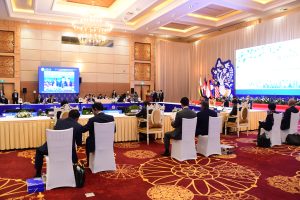Association of Southeast Asian Nations (ASEAN) leaders struggled Friday to come to a consensus on how to pressure Myanmar to comply with a plan for peace, with violence in the member state spiraling out of control since the military seized power in 2021.
The group has banned leaders of Myanmar, also known as Burma, from participating in its top-level events, like the ongoing summit in Phnom Penh, in an effort to pressure them to comply with ASEAN’s Five-Point Consensus plan for peace, so far with little effect.
Indonesian President Joko “Jokowi” Widodo, whose country assumes ASEAN’s rotating chair after Cambodia, told reporters on the sidelines of the summit that he had proposed broadening the ban on Myanmar political representatives beyond the summit and foreign ministers’ meeting to other events — something urged by human rights groups.
“Indonesia is deeply disappointed the situation in Myanmar is worsening,” he said. “We must not allow the situation in Myanmar to define ASEAN.”
The ASEAN plan calls for the immediate cessation of violence, a dialogue among all parties, mediation by an ASEAN special envoy, provision of humanitarian aid and a visit to Myanmar by the special envoy to meet all sides.
Myanmar’s government initially agreed to the plan but has made little effort to implement it. Under the current ban on political representation, Myanmar has been allowed to send non-political representatives to top-level events but has refused.
Talks among ASEAN’s other members — Cambodia, the Philippines, Malaysia, Indonesia, Laos, Singapore, Thailand, Vietnam, and Brunei — about how to put pressure on Myanmar to comply with the five-point plan have been ongoing in Phnom Penh since mid-week.
Singapore and Malaysia, and at times Brunei, have backed Indonesia’s calls for strengthening the measures against Myanmar, according to a diplomat with access to the discussions, speaking on condition of anonymity to talk about the closed-door meetings.
The group has decided not to suspend Myanmar from ASEAN — at least for now. Thailand, backed by Cambodia and Laos, has been pushing back against the Indonesian proposal, arguing that extending the ban on representation would amount to a de facto suspension, the diplomat said.
The situation has been an overarching issue for ASEAN, and Jokowi stressed the importance of coming to an agreement. “The situation in Myanmar must not hold ASEAN hostage,” he said.
At the official opening ceremony Friday, Cambodia’s prime minister broadly cautioned his fellow Southeast Asian leaders against complacency, saying that even though economies are gradually recovering as the COVID-19 pandemic wanes, there is much work to be done.
Prime Minister Hun Sen warned that the region is “now at the most uncertain juncture” as it seeks to promote “peace, security and sustainable growth.” Though he spoke broadly of “strategic challenges we all face” he did not delve into specifics during his opening address.
“We are now enjoying the fruits of our efforts and moving towards sustainable growth,” he said. “We should always be vigilant as the current socio-economic situation in ASEAN as well as in the whole world remains fragile and divided.”
He said the summit’s theme, “Addressing Challenges Together,” should be considered “time relevant.” “There is a saying that disasters and crises can bring out the best in people,” Hun Sen said. “In this connection, I believe that all of us gathering here today share a sense of urgency to work together.”
Jim Gomez contributed to this story from Manila, Philippines.

































